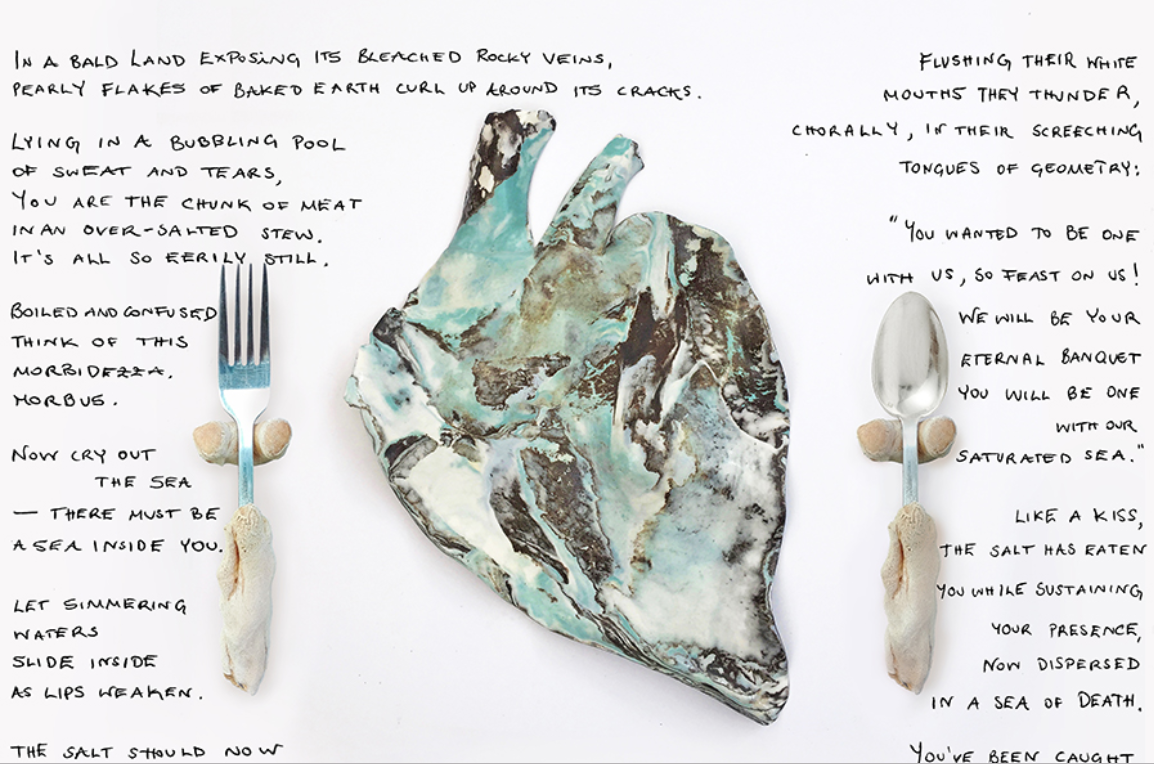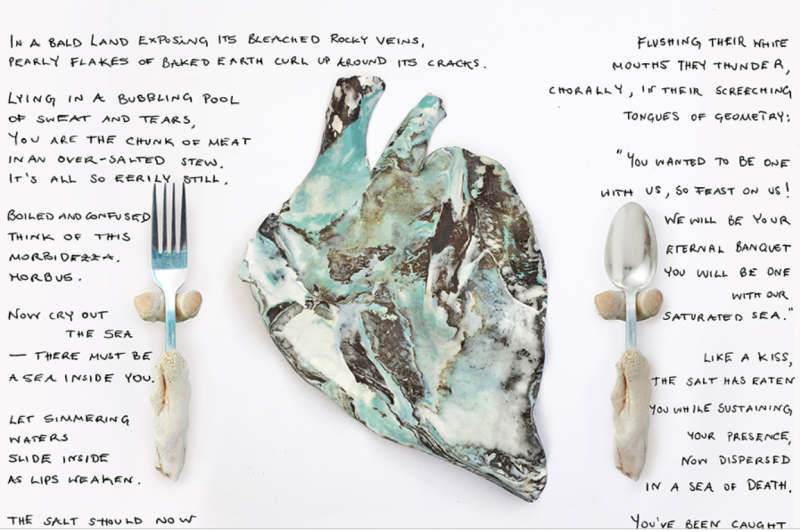15 November 2019
Posted by Charlotte Fodor

To Sate
In our latest So:Write Women session, we tried writing our own recipes (not the edible kind...)
Recipe
/ˈrɛsɪpi/
noun
1. a set of instructions for preparing a particular dish, including a list of the ingredients required.
There is something beautiful about recipes. They have the capacity to transform words into something physical and real, usually food-related, delicious, decadent, moreish. Magic. Their structure is interesting, too: easy to follow, formulaic.
Having recently purchased the Frieze Food Issue, I fell in love with experimental recipe writing in its various formats -- especially the recipes that weren’t edible! Heather Phillipson’s Hot Mess writes the recipe for environmental catastrophe, the very earth itself turning to broth; Zheng Bo lists the ingredients causing a population decline in a district in Kyoto in Suujin Salad. Two very different approaches to recipe writing that I had never really considered before...
In So:Write Women, we marvelled over Sunil Bhandri’s Recipe for Disaster, the second ingredient striking and catching on the tongue – ‘one woman, not yours’. When placed in alignment with Recipe for Living, a piece taken from an Indiana Churchbook, the two poems could not have been more incongruent: ‘1 full cup of love /1/4 cup willpower, packed firm /3 oz. determination /A dash of flexibility /1 large head of understanding’. The group commented that Recipe for Living felt a little smug and did not truly capture the reality of ‘living’ in all its messy glory. It made sense, then, to try to write recipes of our own.
Try it yourself:
Recipe writing. What would the ingredients and method be for making you? What's the recipe for a bad day / a perfect relationship / happiness? Use a recipe format to produce creative, quirky, poignant pieces.
The results were fun; heartfelt; deep.
We had recipes for the bad days: ingredients consisting of pressing the snooze alarm one-too-many times. The recipe for novel writing: endless cups of tea and tears. New ingredients for living: scooping up as much time as we can, for there is never enough. Endless possibilities, and an inspiring way to start us off on a Saturday morning.
Would you like to join us? So:Write Women meet twice a month on the first Thursday and third Saturday. Our next meeting is Saturday 16th November at Southampton Central Library (10.15 – 12.15pm) and at the Art House Café on Thursday 5th December (11.15-1.15pm).
We hope to see you there!
In other news…
Dahlia Books are accepting submissions on the theme of 'Kitchen' until 31 Dec:
http://www.dahliapublishing.co.uk/submission-guidelines
Jo has suggested a brilliant writing prompt related to kitchens below:
Kitchens. Possibly the most sensory room in the home, so take a moment to think of a kitchen, real or imagined, and write down the first answer that comes to mind to these questions: What can you see? What can you hear? What can you smell? What can you taste? What can you touch? Use your answers as the jumping off point for a story or scene set in a kitchen.
And here is another kitchen prompt we explored in class:
'A woman should be a maid in the parlour, a cook in the kitchen and a whore in the bedroom.'
What's your response to this?! Nearly half of men surveyed only ten years ago thought the ability to cook well was the most important skill for a prospective wife...(the research doesn't go on to say how many of these men actually found someone to marry them, alas!)

Archive
Junior & Young Writers Week 3: Return From The Magical World
Junior & Young Writers Week 2: African Mythology
Problems, Problems, Problems...
Cautionary Tales & Christmassy Opening Lines
You've Gotta Have Pace, Pace, Pace
Junior & Young Writers Week 1: Alien Encounters
Junior & Young Writers: Week 5 - Play on Words Pt. 2
Junior & Young Writers: Week 11 - end of term showcase [build a bard workshop]
Junior & Young Writers: Week 10 - Greek Theatre - chorus stories
Junior & Young Writers: Week 9 - Greek Origin Stories - Spring
Rubber Ducks & Writing Festivals
Junior & Young Writers: Week 7 - Greek Hero Stories [the 12 labours of Hercules]
Junior & Young Writers: Week 12 [Wild Words] - Stuff & Things
Junior & Young Writers: Week 11 [Wild Words] - World Building 2
Junior & Young Writers: Week 10 [Wild Words] - World Building
Junior & Young Writers: Week 9 [Wild Words] - Mystery & Choose Your Own Adventure
Junior & Young Writers: Week 8 [Wild Words] - Spooky Sequels & Potion Poems
Junior & Young Writers – Week 10 (Writers’ Inspiration) – Final Showcase
Junior & Young Writers – Week 9 (Writers’ Inspiration) – Editing & Performance Tips
Junior & Young Writers – Week 8 (Writers’ Inspiration) – Cuteness
Time goes on by Tavinder Kaur New
Junior & Young Writers – Week 7 (Writers’ Inspiration) – Natural Solutions
Junior & Young Writers – Week 6 (Writers’ Inspiration) – The Language of Fruit and Veg
Junior & Young Writers – Week 5 (Writers’ Inspiration) – Adventures In Space
Tinklebobs and Bedraggled Angles
Junior & Young Writers – Week 4 (Writers’ Inspiration) – Our Environment
Fortune Tellers & Future Letters
Junior & Young Writers – Week 3 (Writers’ Inspiration) – Home
Young Writers - Week 10 (The Art of Writing) – Final Week Showcase
Junior Writers - Week 10 (The Art of Writing) – Final Week Showcase
Young Writers – Week 9 (The Art of Writing) – Choose Your Own Adventure
Junior Writers – Week 9 (The Art of Writing) – Choose Your Own Adventure
Young Writers – Week 8 (The Art of Writing) – Sequel Stories
Junior Writers – Week 8 (The Art of Writing) – Sequel Stories
Young Writers – Week 7 (The Art of Writing) – Picture Prompts
Junior Writers – Week 7 (The Art of Writing) – Picture Prompts
Young Writers - Week 6 (The Art of Writing) - Script-writing & Dialogue
Junior Writers - Week 6 (The Art of Writing) - Script-writing & Dialogue
Junior Writers – Week 5 (The Art of Writing) – Poetry
Young Writers - Week 5 (The Art of Writing) - Poetry Potions
Edward The Martyr - A Competition!
Mood Boards and Postcards from Space
Young Writers - Week 3 (The Art of Writing) - PLOT
Junior Writers - Week 3 (The Art of Writing) - PLOT
Moomin Stories and Hollywood Pitches
Young Writers - Week 2 (The Art of Writing) - Genre & Setting
Junior Writers - Week 2 (The Art of Writing) - Genre & Setting
Prompts, Dialogues, and Cliché
Story Structure Part One: Exposition and Beyond...
Young Writers - Week 1 (The Art of Writing) - Character
Junior Writers - Week 1 (The Art of Writing) - Character
Young Writers - week 4 - Nature Writing [animals & wildlife]
Junior Writers - week 4 - Nature Writing [animals & wildlife]
Young Writers - week 3 - Nature Writing [trees/plants/flowers]
Junior Writers - week 3 - Nature Writing [trees/plants/flowers]
Young Writers - week 2 - 'fractured fairy tales'
Junior Writers - week 2 - 'fractured fairy tales'
Young Writers - week 1 - 'from deep inside a forest'
Creating Communities through Writing
WORDCUP - Hounsdown Session #6
Making pillows in a house full of feathers
WORDCUP - Hounsdown Session #5
Exploring home – a place, person, house
WORDCUP - Hounsdown Session #4
Stories From Our Streets at the Abbeyfield Wessex Society Reminiscence Session at Poole Library
What Do You Really Mean? Writing Dialogue for Scripts
WORDCUP - Hounsdown Session #3
Character Building & Murder Mysteries
Going inside – from a spark to a story
WORDCUP - Hounsdown Session #2
Maybe I Can Be Invisible After All... Monologues
Creative Writing: Fun Facts, Diverse Voices and Different Perspectives
Writing Competition - Stories From Our Streets
Stories From Our Streets Community Activity Pack
Thinking in-quiet, after the fire
Found Cities, Lost Objects: Women in the City Curated by Lubaina Himid CBE
Ekphrastic Jukebox - Writing to Music
ArtfulScribe LitFest Community Showcase 2023
Young writers exercise their creative power
Writing to The Sorcerer's Apprentice
The Mousetrap - Mayflower Young and Junior Writers Investigate Mystery!
Stories From Our Streets Launch!
Interview: In Conversation with Dr Victoria Leslie
The Missing Farmer/ Blackout Poetry & DADA
Exploring this wonderful World
Using props to create characters/ working as a writing room
Stories of the Dust and Character Questions
Storytelling and Escalation or Rising Action
Junior Writers Club Acrostic Poem
Notes on Intention for MAST Collective - Year 3 - Facilitation Focus
Earthquakes & Dominoes - MAST Collective Blog #4
SUPER MARIO AND POP CULTURE POEMS
Receptionists & Inky Voids - MAST Collective Blog #3
Saying No and saying YES on National Poetry Day!
There's a Dragon in the Wardrobe...
House Warming Party (The Mortifying Ordeal of Being Known) - MAST Collective Blog #2
Intern Blog 5 - The Publishing Process
POEMS TO SOLVE THE CLIMATE CRISIS
On The Streets With Theresa Lola
Intern Blog 4 - The Internship Journey
NEW DIRECTIONS, STARTING SMALL - THE ORWELL YOUTH PRIZE
LIGHTHOUSES, HOPE AND METAPHORS
on workshop and transformations: frogs, lions, and the duck that becomes a larder...
Poetry Ambassadors - Interview with April Egan
Intern Blog 1 - Finding a Voice
World Poetry Day: Fluffypunk and the Invisible Women
On Being a Writer: A Conversation by Beth Phillips & Sam Morton
Poetry Ambassadors - Interview with Kaycee Hill
UNHEARD VOICES: INTERNATIONAL WOMEN'S DAY, AND STORIES OF CONFLICT













